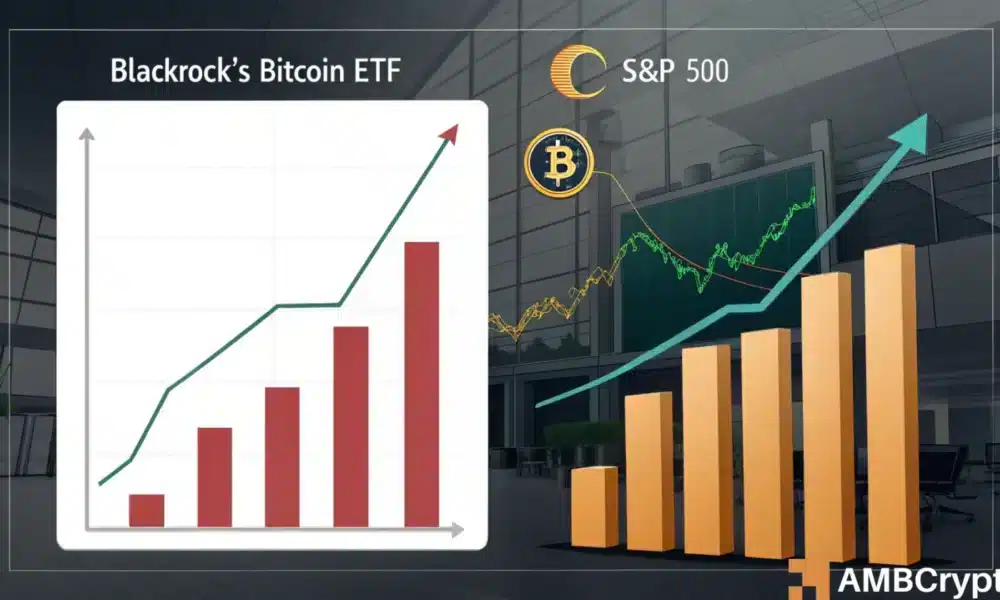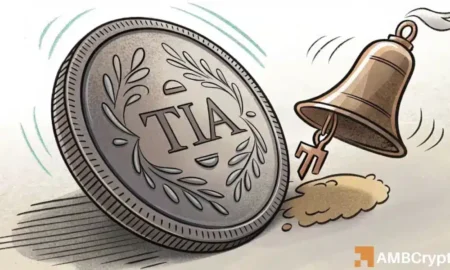BlackRock’s Bitcoin ETF Outperforms S&P 500 Fund: A Shift in Institutional Investment Strategy
In a groundbreaking revelation within the financial world, BlackRock’s Bitcoin ETF, the iShares Bitcoin Trust (IBIT), has outperformed the firm’s well-established S&P 500 ETF (IVV) in revenue generation. Despite managing significantly fewer assets—$52 billion compared to IVV’s astonishing $624 billion—IBIT is projected to earn $187.2 million in annual fees, surpassing IVV’s $187.1 million. This seismic shift signals a broader trend in institutional investment strategies, indicating Bitcoin’s transformation from a speculative asset to a central figure in investment portfolios.
Record-Breaking Revenue for IBIT
According to a Bloomberg report, the contrast between IBIT and IVV underscores the potential profitability for asset managers in the burgeoning field of cryptocurrency ETFs. IBIT commands an expense ratio of 0.25%, while IVV operates with a much lower fee of 0.03%. Interestingly, this higher expense ratio has not deterred institutional investors, who are eager to invest in assets they deem foundational for risk-adjusted returns. Such willingness to pay premium fees reflects a significant shift in market sentiment towards Bitcoin, as more investors recognize the asset’s strategic importance.
Growing Institutional Demand
Prominent figures in the investment community, such as Nate Geraci, President at NovaDius Wealth Management, have commented on the implications of IBIT’s success. He noted that the ETF’s performance highlights the increasing demand for Bitcoin amidst a backdrop of compressed fees in core equity exposure. This trend indicates that investors are now viewing Bitcoin not merely as a speculative asset, but as a valuable addition to their diversified portfolios. Celebrities from the crypto sector, such as Anthony Pompliano and Cade O’Neill, have echoed this sentiment, emphasizing that institutional interest in Bitcoin has transitioned from curiosity to a commitment to long-term investment.
A Testament to Institutional Confidence
In addition to the financial success of IBIT, the trust has recently made headlines with a substantial $638.5 million Bitcoin purchase, totaling 6,088 BTC. This strategic acquisition suggests that large institutions such as BlackRock recognize Bitcoin’s value amid market fluctuations. Despite recent net outflows in other spot Bitcoin ETFs, BlackRock’s commitment illustrates a substantial long-term confidence in the cryptocurrency. Investors are increasingly viewing Bitcoin not just as a speculative asset but as a reliable store of value that deserves a place in core investment strategies.
A Surge in Inflows
The influx of investments into IBIT has been remarkable. Since January, the fund has recorded $52.4 billion in inflows, which eclipses competing crypto ETFs like those managed by Fidelity. The continuous inflow reinforces the idea that institutional investors are adapting their strategies to include Bitcoin as a central element. Moreover, the recent surge in Bitcoin’s price—currently standing at $108,974.54—further highlights the growing acceptance of this cryptocurrency in wealth management across various institutional platforms.
Future Implications for Investment Strategies
The ascent of IBIT in terms of revenue generation is not just a fleeting trend but a manifestation of changing attitudes towards digital assets. As institutional investors increasingly allocate a portion of their portfolios to cryptocurrencies, the market can expect enhanced liquidity and stability. Consequently, the traditional boundaries of investment will continue to blur, making way for a more integrated approach that combines tech and traditional finance. The growing support from institutions could lead to increased regulatory clarity and more robust structures within the cryptocurrency market.
In conclusion, BlackRock’s Bitcoin ETF surpassing its S&P 500 counterpart marks a pivotal shift in investment paradigms. As Bitcoin moves from the fringes of speculation to a core component of institutional investment strategy, it becomes increasingly essential for asset managers to adapt their portfolios. This ongoing evolution affirms Bitcoin’s role in reshaping the landscape of modern finance. The future looks bright for Bitcoin and cryptocurrency ETFs, paving the way for new opportunities in investment strategies.
















